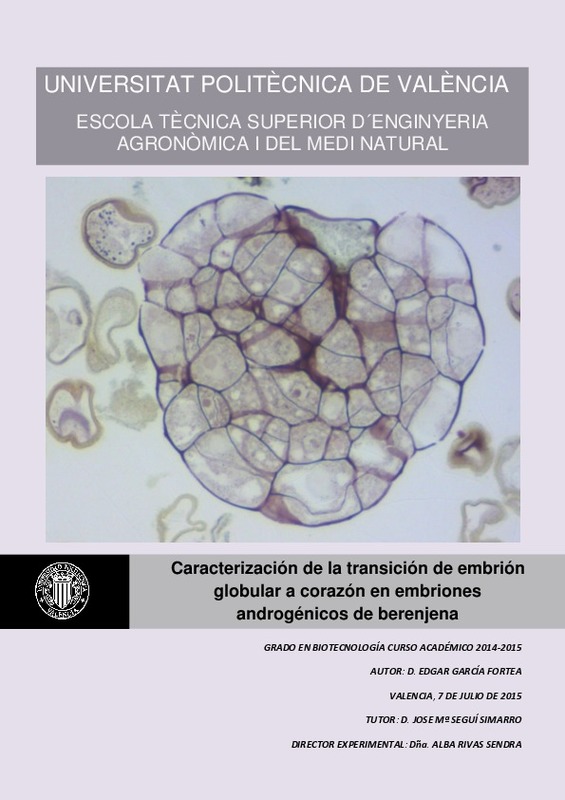JavaScript is disabled for your browser. Some features of this site may not work without it.
Buscar en RiuNet
Listar
Mi cuenta
Estadísticas
Ayuda RiuNet
Admin. UPV
Caracterización de la transición de embrión globular a corazón en embriones androgénicos de berenjena
Mostrar el registro sencillo del ítem
Ficheros en el ítem
| dc.contributor.advisor | Seguí Simarro, José María
|
es_ES |
| dc.contributor.author | García Fortea, Edgar
|
es_ES |
| dc.date.accessioned | 2015-09-04T16:18:20Z | |
| dc.date.available | 2015-09-04T16:18:20Z | |
| dc.date.created | 2015-07-17 | |
| dc.date.issued | 2015-09-04 | es_ES |
| dc.identifier.uri | http://hdl.handle.net/10251/54312 | |
| dc.description.abstract | [ES] La puesta a punto de métodos eficientes de obtención de individuos doble haploides (DHs) es uno de los objetivos principales de muchas empresas empresas de mejora genética, pues permiten obtener líneas puras de forma más rápida y económica que con métodos tradicionales. La inducción de androgénesis es el método más utilizado y conocido para obtener DHs. En berenjena, una vez se ha inducido la androgénesis, llega un momento en que las células del embrión abandonan su patrón de desarrollo y dan lugar a un conjunto de células indiferenciadas, definido como callo. En este proyecto se pretende estudiar qué eventos morfológicos y de regulación hormonal acontecen en los embriones globulares androgénicos, con el fin de comprender por qué estos evolucionan hacia callos y no hacia embriones corazón. Con estos resultados se pretende poder evitar dicho proceso, optimizando el protocolo de manera que se puedan obtener plantas DH directamente de embriones, y no de callos como hasta ahora. | es_ES |
| dc.description.abstract | [EN] Obtaining double haploid organisms is one of the main objectives of many agricultural companies as well as companies of genetic improvement. The cross between two pure lines allows getting hybrid, homozygous for all its characters. This type of organism presents some agronomic traits of great value, as for example hybrid vigor, greater resistance to different biotic and abiotic stress, homogeneity in crops... as well as some genetic features of great interest at the time of getting genetic maps and other studies. Androgenesis is one of the ideal methods for obtaining pure lines and it presents obvious advantages over the traditional methods, enabling you to get these lines in less time and with fewer economic resources. The Cell biology Lab of the COMAV (Universitat Politècnica de Valencia) has managed to develop different protocols for obtaining double haploids through androgenesis in various plant species. One of them is Solanum melongena. The protocol in eggplant has allowed successfully obtaining pure lines, with an acceptable efficiency. But there is a critical point in the microspore development during in vitro culture. Once it has induced androgenesis in these microspores, it comes a point in the development of the embryo in which cells leave the pattern of embryogenic developing, giving rise to a set of undifferentiated cells, defined as callus. This study seeks understanding what is happening at the histological level in these cells and what are the factors that are diverting the embryo from its natural path. Once it has been understood which processes are taking place in these cells, it could be studied how avoiding it, by this way the protocol will be optimized preventing the process of organogenesis induced in callus, getting double haploid plants directly from embryos. | es_ES |
| dc.language | Español | es_ES |
| dc.publisher | Universitat Politècnica de València | es_ES |
| dc.rights | Reserva de todos los derechos | es_ES |
| dc.subject | Androgénesis | es_ES |
| dc.subject | Cultivo in vitro | es_ES |
| dc.subject | Berenjena | es_ES |
| dc.subject | Embriogénesis | es_ES |
| dc.subject | Embryogenesis | es_ES |
| dc.subject | Androgenesis | es_ES |
| dc.subject | Starch | es_ES |
| dc.subject | Lipids | es_ES |
| dc.subject | Proteins | es_ES |
| dc.subject | Iron | es_ES |
| dc.subject | Solanum melongena | es_ES |
| dc.subject.classification | GENETICA | es_ES |
| dc.subject.other | Grado en Biotecnología-Grau en Biotecnologia | es_ES |
| dc.title | Caracterización de la transición de embrión globular a corazón en embriones androgénicos de berenjena | es_ES |
| dc.type | Proyecto/Trabajo fin de carrera/grado | es_ES |
| dc.rights.accessRights | Abierto | es_ES |
| dc.contributor.affiliation | Universitat Politècnica de València. Escuela Técnica Superior de Ingeniería Agronómica y del Medio Natural - Escola Tècnica Superior d'Enginyeria Agronòmica i del Medi Natural | es_ES |
| dc.contributor.affiliation | Universitat Politècnica de València. Departamento de Biotecnología - Departament de Biotecnologia | es_ES |
| dc.description.bibliographicCitation | García Fortea, E. (2015). Caracterización de la transición de embrión globular a corazón en embriones androgénicos de berenjena. http://hdl.handle.net/10251/54312. | es_ES |
| dc.description.accrualMethod | TFGM | es_ES |
| dc.relation.pasarela | TFGM\22856 | es_ES |
Este ítem aparece en la(s) siguiente(s) colección(ones)
-
ETSIAMN - Trabajos académicos [3541]
Escuela Técnica Superior de Ingeniería Agronómica y del Medio Natural






